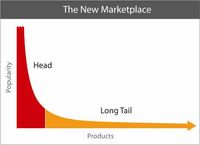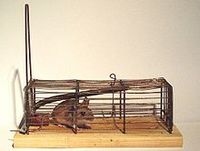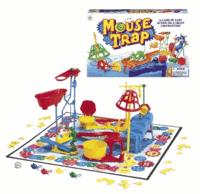
Instead of just going after the big customers, he said, prosperity would come by serving smaller markets more effectively, using computer technology. Here it is illustrated, from his blog.
Maybe. (Anderson is now focused on the making phenomenon.)
But the big story of 2011 is how the long tail can bite.
In many industries you don't just have a long tail of buyers, you have one of sellers, and by going after the long tail of sellers lawyers can cause enormous damage.

But the real Long Tail problem involves patents.
Software patents create what I call the Roberts Innovation Tax. Because the Supreme Court refused to disallow what previous courts had created — patents on concepts that prevent innovation rather than encouraging it — everyone in the business is now creating vast patent storehouses, and suing the heck out of one another to gain leverage that would be better gained through the market.
We usually focus on the big cases in that fight — Oracle vs. Google for instance. But the real price is paid for by tiny companies, one-man companies.
Florian Mueller has written eloquently about this in regard to a company called Lodsys, which is suing every app store developer in site for (supposedly) infringing on patents Apple had already licensed. But there are thousands of patent applications made every day.
Claims are manipulated within the patent office so that a grant is made covering, say, a way to ask someone questions, and pretty soon that new patent holder is suing every little guy in sight for violating their patents on electronic forms. That's what a troll called Macrosolve is doing, Mueller charges.
But notice how they're going about getting paid. Instead of going after the big fish, as SCO did, they're going after the little fish, the long tail. If you're a one-man band creating software that lets companies create electronic forms, Macrosolve is going after you. If you try to fight, your lawyer will bankrupt you. If you decide to settle, Macrosolve is bound to be followed by dozens of other patent holders on various electronic forms.
What the Roberts Court did was to prevent entrepreneurship in computing. That's its lifeblood. A company like Apple can't grow as it wants without hundreds of little "app store" developers writing apps for the iPhone and iPad. But those companies can't survive in the present patent environment, because patent holders are abusing the system by going after the Long Tail — just as Apple is doing with regard to trademarks.
It truly bites.

In the case of MacroSolve, this might mean they could get a patent on the way they do electronic forms, just not on the idea of doing electronic forms. To gain damages against anyone they would have to prove that the company in question was creating electronic forms just as they do.
I know, that's a copyright test, not a patent test, and the impact of putting the test in the law would be to eliminate the value software patents have.
But so what?










